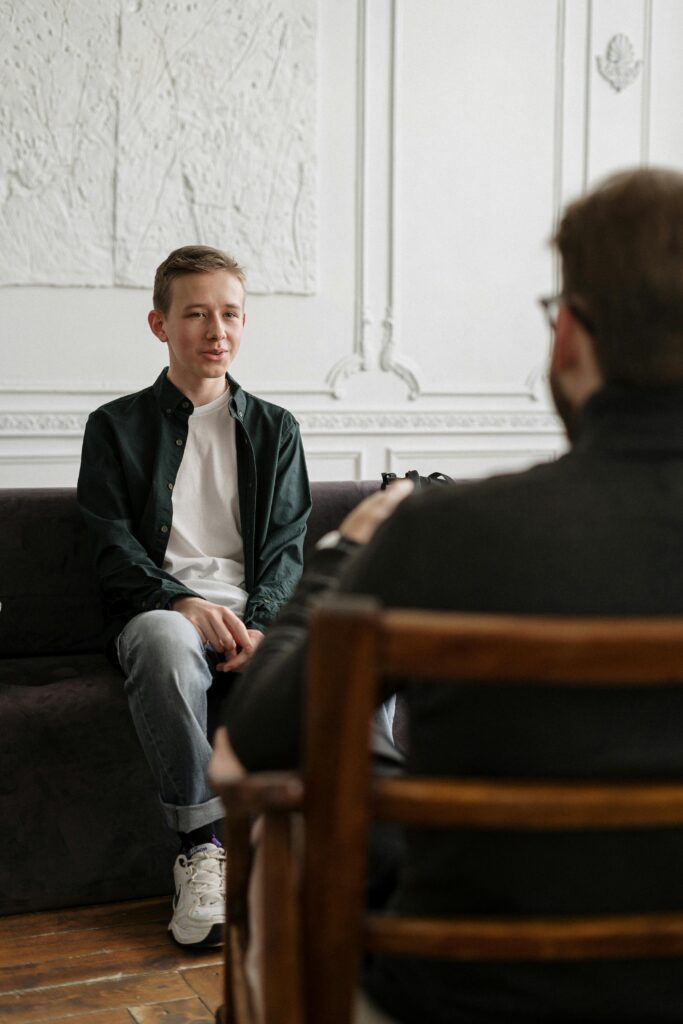Emotional Vulnerability
Table of Contents
What is vulnerability
We all experienced situations in life where we were uncertain. This might be standing up for oneself, expressing our needs, telling someone the truth even though they might judge it, going on a date, not knowing if the other person will come etc. This creates anxiety and worry about a future outcome that didn’t even happen yet, and that WE create in our own minds based on our early life traumas. We all developed coping mechanisms to help us survive as a toddler. This can come in the form of avoidance, passive aggressiveness, hiding truths about oneself to others, pushing people away, self-sabotage, but to name a few. Although these mechanisms helped us “survive” as toddlers, we hold on to them as adults even though they don’t serve us anymore. Emotional vulnerability is the courage to walk into uncertainty even if it is scary, trusting that we will come out stronger on the other side and that we can handle it.

Myths about vulnerability
Vulnerability is seen by many people as a sign of giving in or weakness. I myself viewed vulnerability as a weakness or as a form of submission until my early thirties. I can tell you now that vulnerability is non of those things. To understand what vulnerability is, we must first understand what vulnerability is not. Let’s explore the common myths of vulnerability.
- Vulnerability is weakness
We’ve all been told some time or another, to suck it up, stop being a P#$@y, man up, men don’t express feelings, basically saying SUPRESS your feelings and under no circumstances express them because doing so you will be seen as a wimp and weak. Vulnerability is at the core of emotions and denying ourselves to be vulnerable is to deny the existence of our emotions. We all know emotions are real, come on admit it, you felt it before too! When we deny ourselves to be vulnerable we, by default, bottle up our emotions and if you haven’t seen a pressure cooker explode before, I highly encourage you to go see it on youtube. It is hard to express our emotions, opinions and thoughts in real time in an honest and authentic way. We fear being judged, sounding stupid, being laughed at, being criticized and so on. Therefore to be vulnerable actually means to be courageous and strong despite feeling fear and the urge to do anything but express ourselves.
- Vulnerability is wearing your heart on your sleave
Expressing ourselves honestly and trusting people is a very important part of being psychologically healthy. This does NOT mean opening up and telling every Tom, Dick and Harry our deepest darkest secrets and sharing our traumas with everyone willing to listen. Instead it means to identify people in our lives who we can trust and feel safe with to share our worries, anxieties, pain and ideas with. If we meet someone new, I suggest the “steps-method” where you share in relation to the time you know them. Opening up slowly, sharing minor worries etc. and seeing if they can be trusted at first. As time goes by and they have proved that they can be trusted, share some more with them, and so on. Also notice what they are willing to share with you, because that is part of building a relationship/friendship and trust with another person.
- I can do it alone!
We all overestimate our ability to deal with things alone. Dealing with issues alone is effective to a certain degree but it has its limits. There is no replacement for expressing yourself openly and honestly to a person you can trust and feel safe with. This can help us sort through our thoughts and feelings, identify the problem, brainstorm possible solutions, release negative emotions and counter the feeling of being alone in the situation. I recently went through a really dark place and if I didn’t have people who I can open up to, I wouldn’t have released the steam from my emotional pressure cooker. I am truly grateful for the trustworthy people in my life.

Coping Mechanisms
Everyone has experienced some kind of abandonment as a child. Young children are all narcissists, so were we when we were little. We thought the whole world revolved around us. When we had a need and our imperfect parents didn’t get that need met, we automatically perceived it as they don’t love us and we felt abandoned. We might have felt like we don’t deserve to have needs or felt guilty for having needs. When our parents had a tough day at work, and they were tired and maybe just wanted to relax , we might have interpreted it as they didn’t want to play or interact with us and therefore it means they don’t love us anymore. We decided that we are not worthy of their love and attention and developed beliefs and coping mechanisms to deal with the abandonment and to protect ourselves from getting hurt again in the future. All of us have our own unique set of coping mechanisms we learned when we were toddlers. We all learned in some way or another that the world is not a safe place and that we need to behave in a way to protect ourselves from getting hurt. These coping mechanisms served us when we were little, but as adults they hold us back from getting our needs met and thriving in life. Let’s explore some of those coping mechanisms in more detail and take a look at how actively practicing vulnerability can set us free.
- Withholding information
When a child is little, does something “wrong” and get scolded or punished for it when telling their parents the truth, the child might decide that it is not safe to tell people the truth because they will get criticized and punished for it. They believe that they are inherently bad, that mistakes are bad and that they are not to be accepted. They might adapt the coping mechanism of lying or being secretive.
In adulthood this behavior is detrimental to building and maintaining healthy relationships. It is inevitable for us to make mistakes and then instead of telling the truth, we revert back to our coping mechanism and rather tell a lie, or hold back information instead because we believe it is not safe to tell the truth.
When we adopt the practice of vulnerability as adults, we quickly learn that no one is perfect, everyone makes mistakes and that is OK because it is part of the human experience. Afterall, people connect with one another through openly reveling mistakes and failures, therefore, being “perfect” is seen as unnatural and fake. Being vulnerable can set us free from this behavior and help us to form strong, intimate relationships with other people based on the truth.
- People pleasing
This behavior is learned in childhood when we get our needs met or feel accepted only when… fill in the blank. Only when we behave well, do something for someone, get good grades, we are friendly, don’t express disapproval, we are nice, always fall in line etc. Or it might play out as parents being overly critical and the only way for us to feel safe and not experience their wrath or that look of disappointment or disapproval on their face, is by pleasing them and never being a moments trouble.
We then carry this behavior into adulthood and seek approval from others so that we can feel loved and accepted. The problem with this behavior is that there is always strings attached. We then try to please others by doing something for them, always being there for them, letting people walk all over us, always being friendly and positive, trying to be perfect etc. for them to meet our needs. When they don’t return the favor or get our unexpressed needs met, resentment inevitably builds up and that in turn prove to us that we need to please them even more, and the cycle continues.
As a recovering nice guy and people pleaser myself, I have learned that this is a loosing strategy that only negatively influence myself and my relationships with others. Actively practicing vulnerability can help us become aware of when we have the impulse to act in a pleasing way and then having the courage to act in an opposite way.
- Avoiding conflict
When we were children and we disagreed with someone on something and our opinion was not acknowledged or worse criticized and punished, we learned that it is not safe to express disagreement, anger and frustration. This also applies to when we disagreed with parents on something and they never let us express ourselves or they never let us “win” or find mutual ground. In other words, their way or the highway. Therefore, the only way we found to deal with it and feel safe was to avoid conflict and any situation that might invoke conflict, like the plague.
People have different views and opinions and therefore conflict is inevitable and a normal, sometimes necessary, part of life. Handling conflict effectively is a vital skill we all must develop in order to nurture and grow relationships and gain the trust of others. Sometimes when someone oversteps a boundary and we feel angry and disrespected, it is necessary to express anger or frustration in a socially acceptable manner. It is therefore vital to learn how to show our teeth without biting and ripping someone else, or a relationship we hold dear, to shreds.
We can do so by directly, honestly and authentically expressing the anger we feel in a non toxic manner. Practicing vulnerability allows us to do so in a timely fashion. I myself find conflict challenging till today. I learned that when I feel disrespected, angry or frustrated I tend to ignore conflict by not expressing myself in a direct and timely way. This in turn robs my relationships of growth and builds resentment in me that will eventually explode and that is WAY worse than to experience a little conflict in the moment. Being vulnerable in the moment and expressing my feelings and thoughts helped me in many situations not to let resentment fester in me.
- Blaming and shaming
In childhood we learn through observing others. If our parents go-to method for dealing with conflict and challenges was to always blame others or something outside of their control, then we pick up the belief to not take responsibility for our actions and that there is always someone or something else to blame.
This plays out in adulthood in a variety of ways. When we find ourselves in a conflict situation we quickly shift the blame even if we were at fault. This is seen when two grownups argue about something and instead of listening, acknowledging and trying to understand the other person’s point of view, we blame them for something they did in the past or we shame them for confronting us or for one of their weaknesses.
We can change this toxic pattern of behavior by practicing active listening, acknowledging what they are communicating and being vulnerable by taking responsibility if we were at fault. This is no easy task and it takes a lot of awareness on our behalf, but is worth the effort and is essential for growth and letting go of this destructive paradigm.
- Numbing, over indulgence and addiction
We learn this behavior by observing how our parents and adults in our lives deal with stress, anxiety and uncertainty. When emotions gets too overwhelming, some people go on food binges, start abusing drugs and alcohol in an effort to numb and suppress the emotions lurking in the dark. It is only by shining light on the emotion and facing it head on that we can overcome this behavior.
Practicing vulnerability is the belief that even in dark times or overwhelming situations, we can handle it and come out on the other side in one piece. Vulnerability is shining a light on the darkness and being open to be hurt, and that is ok and part of life, but to know that we are stronger than the perceived emotion or situation.

Helpful tools to practice vulnerability
- When facing a situation where you become aware of a coping mechanism taking over, count backwards from 5, when you reach zero, just do the healthy behavior instead.
Examples:
You feel disrespected, angry or frustrated, instead of pushing it down or ignoring it and leting resentment build up, count backwards from 5 and just express yourself in a direct way. Use “I” statements instead of “you” statements. “I feel angry/frustrated/disrespected when you… fill in the blank.
- Journal, become aware and make a list of things or situations that trigger your coping mechanisms. Keep those situations in mind and become aware of yourself in those situations and actively choose to be vulnerable and have the courage to do the opposite.
- Work with a qualified therapist to find strategies to improve your coping behaviors.
- Begin small by being vulnerable and opening up to a trustworthy person. It can be a friend, family member, spouse, therapist etc. Begin with small issues and work your way up.

Ways to actively practice vulnerability
There is no greater satisfaction in life than to be yourself unapologetically. We can start this journey by actively practicing to be vulnerable in our everyday lives. We can actively practice vulnerability by:
- Standing up for ourselves
- Setting healthy boundaries and maintaining them
- Expressing ourselves honestly and directly in a socially acceptable manner
- Expressing our needs clearly and taking care of our needs
- Focus only on what we can control
- Accepting and letting go of the rest
- Saying no and meaning it
- Sharing our ideas and thoughts
- Going on a first date
- Falling in love
- Starting the business you always wanted to start
- Accepting accountability
- Admitting ones mistakes and asking for forgiveness
- Introducing your new partner to your friends or family
- Being open to feedback
Honestly, the list goes on and on, but I am sure you get the point.

Helpful books
Conclusion
Knowing and understanding what vulnerability is has fundamentally changed my life, because it helped me identify areas in my life where I am not honest with myself and others, people pleasing, not standing up for myself, not being able to directly say no and mean it and many more. If you found this article useful, please share it with your loved ones. Until next time.





